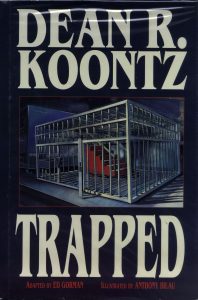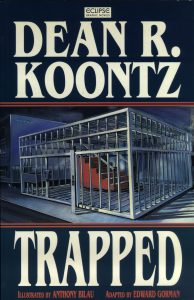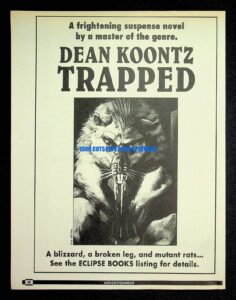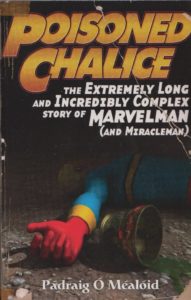Trapped (DRK GN)
Trade Hardcover

Artwork © 1992 Anthony Bilau
Adaptation © 1992 by Ed Gorman
Trade Paperback Edition – State one

Artwork © 1992 Anthony Bilau
Adaptation © 1992 by Ed Gorman
Trade Paperback Edition – State two

Artwork © 1992 Anthony Bilau
Adaptation © 1992 by Ed Gorman
Notes
Advertisements:

Other editions:

 Some interesting details on the demise of Ecplise Comics from Poisoned Chalice: The Extremely Long and Incredibly Complex Story of Marvelman (and Miracleman) by Pádraig Ó Méalóid (p205-6):
Some interesting details on the demise of Ecplise Comics from Poisoned Chalice: The Extremely Long and Incredibly Complex Story of Marvelman (and Miracleman) by Pádraig Ó Méalóid (p205-6):
Dean Mullaney, in an interview quoted in an undated article on the Poor Mojo Newsletter website called I Always Wondered What Killed Eclipse Comics, had a very different version of events,
The irony of all this is that, in this day and age when graphic novels are regularly reviewed in the mainstream press, the reason Eclipse went under was due to my single-minded desire to establish graphic novels in mainstream bookstores. Eclipse had signed a mutually exclusive contract with HarperCollins to produce graphic novels. The plan was to first introduce
titles by authors already known to booksellers-JRR Tolkien, Clive Barker, Dean Koontz, Anne McCaffrey… we even had an original by Doris Lessing
in the planning stages.
Unfortunately, HarperCollins didn’t, in my opinion, really understand what graphic novels were all about. And there were internal conflicts at HarperCollins, to which I was never privy, that left Eclipse holding the bag. They had given us an advance to start production, but that money ran out, and we had a full schedule in production. We never received a single royalty statement, let alone check, from HarperCollins’s sales to bookstores. The cash flow deficit eventually forced us to close up shop.
In an interview ith Richard J Arndt quoted in the same article, he says,
I’ve never really told anyone why Eclipse folded. It had nothing to do with cat and I getting divorced. First of all, the comics specialty market was in the toilet. […] We were a small, family-run business. So things were incredibly tight. Eclipse didn’t have bankable continuing monthly series. We entered into a co- publishing deal with HarperCollins. […] It was an exclusive deal both ways. In the beginning, it was a fantastic relationship. […] The problems started when we asked for sales figures on the other books (Miracleman, Clive Barker’s titles, Dragonflight, Dean Koontz’s Trapped, etc). We never-EVER-received a single sales statement. Therefore, no royalty statements. So there I was, paying advances to creators (bigger than the top rates in the field at the time-hey, we were going to be in bookstores, too!), tying up all my capital. And then nothing from Harper. No statements, no money. Meanwhile, creators were naturally asking for THEIR statements and royalties. I explained the situation, but still never got anything from Harper. It got to the point that I had no cash left to even carry on normal business because we had laid out everything we had for advances.
All that was left to do was sell off every piece of inventory I could get my hands on, pay all the little guys (individual creators and small vendors), and stiff the large ones (printers and freight companies). And declare bankruptcy. I still have no idea how many copies of our graphic novels Harper sold, or what they did with the money owed us and creators. But my plan for placing graphic novels in bookstores was still a good one. I just picked the wrong publisher and was about ten years too early. If Eclipse were around now, there’s no doubt that we would be the leading graphic novel publisher in mainstream bookstores.
Last updated on March 23rd, 2018
